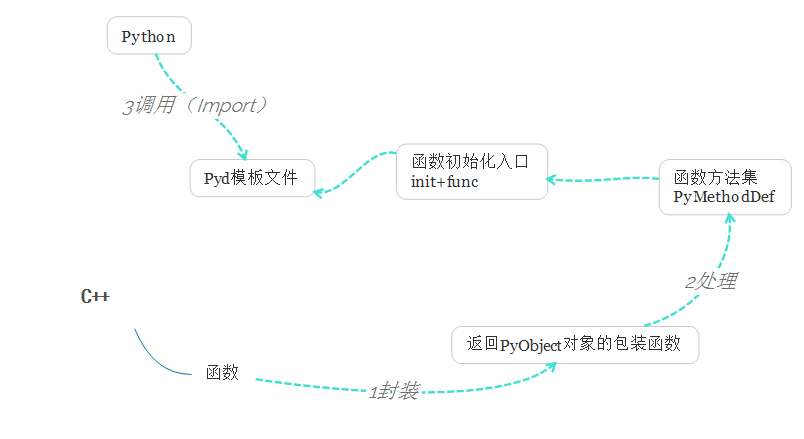Python与C++互动编程
2015-11-17 09:59
423 查看
C++嵌入Python
实现原理
SKILL
能够实现在C++中嵌入对Python函数的调用、对象的创建、类的调用;
代码
#include <iostream>
#include "Python.h"
using namespace std;
int main(int argc, char *argv[])
{
int j;
int i = 12;
Py_Initialize();
if (!Py_IsInitialized())
{
cout << "not INit" << endl;
getchar();
return -1;
}
PyObject *pModule = NULL;
PyObject *pFunc = NULL;
PyObject *pNum = NULL;
PyObject *pGet = NULL;
PyObject *pStu = NULL;
PyObject *pInstan = NULL;
PyDict_New();
PyRun_SimpleString("import sys");
PyRun_SimpleString("sys.path.append('./')");
pModule = PyImport_ImportModule("hello");
if (!pModule)
{
cout << "not module" << endl;
getchar();
return -1;
}
pFunc = PyObject_GetAttrString(pModule, "hi");
if (!pFunc)
{
cout << "not func" << endl;
getchar();
return -1;
}
//pGet = PyInt_FromLong(i);
pGet = Py_BuildValue("(i)",i);
//pGet = PyTuple_New(1); //
//PyTuple_SetItem(pGet, 0, PyInt_FromLong(i));
//
//pNum = PyObject_CallFunction(pFunc, "i",1);
pNum = PyObject_CallObject(pFunc, pGet);
//pNum = PyEval_CallObject(pFunc, pGet);
//
j = PyInt_AsLong(pNum);
cout << j << endl;
Py_DECREF(pFunc);
pFunc = PyObject_GetAttrString(pModule, "Student");
if (!pFunc)
{
cout << "not func" << endl;
getchar();
return -1;
}
pStu = PyInstance_New(pFunc, NULL, NULL);
if (!pStu)
{
cout << "notstu" << endl;
getchar();
return -1;
}
PyObject_CallMethod(pStu, "SetNam","s","lilei");
PyObject_CallMethod(pStu, "print_name",NULL,NULL);
getchar();
Py_Finalize();
return 0;
}遇到并解决的问题
编译时需要VS工具选项中调试-符号的符号自动加载来为编译文件自动加载符号;
项目的预编头文件需要加上WIN;
需要把py文件放到exe生成文件的同级目录下才能进行查找
未解决的问题
pGet = PyInt_FromLong(i)用这样的方式创建一个PyObject变量无法创建并导致后面的函数执行全部出错;
如果要获取Py文件中已经赋值了的对象,是否只能通过py文件中的函数才能获取得到?
C++扩展Python
实现原理
SKILL
能够实现在将C++的函数封装,转化成可被Python调用的模板、Python C API的函数应用;
代码
#include <iostream>
#include "Python.h"
using namespace std;
int numchan(int a)
{
return a + 1;
}
static PyObject * _numchan(PyObject *self, PyObject *argc)
{
int a;
int re;
PyArg_ParseTuple(argc, "i", &a);
re = numchan(a);
cout << re << endl;
return PyInt_FromLong(re);
}
static PyMethodDef numchanModuleMethods[] = {
{
"numchan",
_numchan,
METH_VARARGS,
""
},
{NULL,NULL,0,NULL}
};
PyMODINIT_FUNC initnumchan(void)
{
Py_InitModule("numchan", numchanModuleMethods);
}遇到并解决的问题
函数初始化入口的名称必须和之前的封装函数的名称完全一致;
生成pyd文件的时候需要通过VS命令行编译生成;
封装的函数和该函数返回的对象必须都是PyObject;
未解决的问题
如果不使用生成pyd或者dll文件的方式进行扩展Python的话,那么扩展的具体实现是怎么样的?把C++转化成Python可调用的对象是什么对象?PyObject??然后Python调用的时候通过函数直接去调用吗?还是通过Import?
猜测是否是下图模式

相关文章推荐
- 使用C++实现JNI接口需要注意的事项
- Python动态类型的学习---引用的理解
- Python3写爬虫(四)多线程实现数据爬取
- 垃圾邮件过滤器 python简单实现
- 下载并遍历 names.txt 文件,输出长度最长的回文人名。
- install and upgrade scrapy
- Scrapy的架构介绍
- Centos6 编译安装Python
- 使用Python生成Excel格式的图片
- 让Python文件也可以当bat文件运行
- [Python]推算数独
- Python中zip()函数用法举例
- Python中map()函数浅析
- 关于指针的一些事情
- Python将excel导入到mysql中
- Python在CAM软件Genesis2000中的应用
- 使用Shiboken为C++和Qt库创建Python绑定
- FREEBASIC 编译可被python调用的dll函数示例
